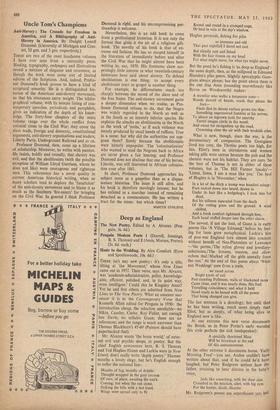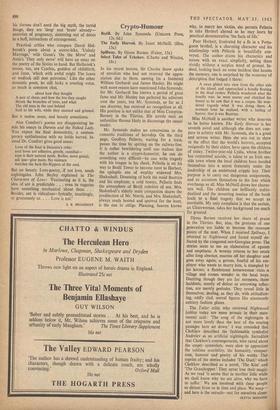Deep as England
Penguin Modern Poets 1 (Durrell, Jennings, R. S. Thomas) and 2 (Amis, Moraes, Porter). (2s. 6d. each.)
THERE isn't any new poetry: it's only a title, tilting at 'the Movement,' whose New Lines came out in 1957. Their verse, says Mr. Alvarez, was 'academic-administrative, polite, knowledge- able, efficient, polished, and, in its quiet way, even intelligent.' Could this be Kingsley Amis? Yet he and five others are admitted from New Lines to The New Poetry. What an amateur suc- cessor it is to the Contemporary Verse that Kenneth Allott edited for Penguin in 1950: the introduction cheap, the selection unreliable—no Silkin, Causley, Corke, Roy Fuller, not enough late Davie, no syllabic Gunn; there are no references; and the range is much narrower than Thomas Blackburn's 45-60 (Putnam should have paperbacked that).
Mr. Alvarez wants 'the brute world,' of exter- nal evil and psychic deeps, in poetry. But the chief English newcomers here, R. S. Thomas and Ted Hughes (Gunn and Larkin were in New Lines), don't really write 'depth poetry.' Thomas mouths a lovely elegy, but he's English enough to suffer the national fate:
Months of fog, months of drizzle: Thought wrapped in the grey cocoon Of race, of place, awaiting the sun's Coming; but when the sun came, Striking the hills with a hot hand, Wings were spread only to fly Round and round in a cramped cage, Or beat in vain at the sky's window.
Hughes portends, fishing for pike so immense and old That past nightfall I dared not cast But silently cast and fished With the hair frozen on my head For what might move, for what eye might move.
But the pond he's fishing is 'as deep as England': the same depth, then, as the millpond in Edmund Blunden's pike poem. Slightly apocalyptic Geor- gians always please; but the point about them is the one that Amis (sounding marvellously like Byron on Wordsworth) makes: A traveller who walks a temperate zone— Woods devoid of beasts, roads that please the foot—
Finds that its decent surface grows too thin: Something unperceived fumbles at his nerves. To please an ingrown taste for anarchy Torrid images circle in the wood, And sweat for recognition up the road, Cramming close the air with their bookish cries.
What is new, though, since the war, is the documentary of compassion. The Georgians lived too cosy, the Thirties poets too high, for this. Eliot's men in shirtsleeves and women taking pills were untrue because the pub and the chemist were not his habitat. They are ours. So the best of Thomas is not in either of these volumes, but in 'The Hill Farmer Speaks'— `Listen, listen, I am a man like you.' The best of Hughes is in 'November,' when
In a let of the ditch a tramp was bundled asleep: Face tucked down into beard, drawn in
Under its hair like a hedgehog's. I took him for dead,
But his stillness separated from the death
Of the rotting grass and the ground. A wind chilled,
And a fresh comfort tightened through him,
Each hand stuffed deeper into the other sleeve. The newest, if not the best, of Gunn is in early poems like 'A Village Edmund,' before his feel- ing for louts grew metaphysical. Larkin's bits of post-war England turn almost into symbols without benefit of Neo-Platonism or Lawrence —`the perms,/The nylon gloves and jewellery- substitutes,/The lemons, mauves, and olive- ochres that/Marked off the girls unreally from the rest.' At the end of that poem about `Whit- sun Weddings' seen from a train, we raced across
Bright knots of rail Past standing Pullmans, walls of blackened moss Came close, and it was nearly done, this frail Travelling coincidence; and what it held Stood ready to be loosed with all the power That being changed can give.
The last sentence is a doxology; but until then he has been writing, much more simply than Eliot, but as deeply, of what being alive in England now is like.
At one extreme this new verse documents the Bomb, as in Peter Porter's early warning (his style perfects the sick loudspeaker):
A specially shortened Mass
Will be broadcast at the end Of this announcement.
At the other extreme it documents home. TarlY Morning Feed'—you see, Auden couldn't have written about that, and if he could he'd have laughed; but Peter Redgrove notices how the father, straining to hear distress in the baby's voice,
feels like something, with the door ajar, Crouched in the bracken, alert, with big eyes For the hunter, death, disaster.
Mr. Redgrove's poems are unproficient yet; but
his themes don't need the big myth, the torrid image, they are 'deep' and 'brute' already— anxieties of pregnancy, slamming out of doors in a huff, intimations of estrangement.
Practical critics who compare David Hol- brook's poem about a motor-bike, 'Unholy Marriage,' with Gunn's 'On the Move' and Amis's 'They only move' will have an essay on the poetry of the Sixties to hand. But Holbrook's muses, too, are Cynthia, goddess of childbirth, and Juno, 'which with awful might The lawes of wedlock still dost patronize.' Like the other domestic poets, he still lacks a creating voice, so much is common chat,
about how they bought A pair of shoes, and how the bus they caught Struck the branches of trees, and what The old man in the seat behind Said to his wife, while they sneezed and grinned.
But it makes sense, and beauty sometimes.
Alex Comfort's poems are disappointing be- side his essays in Darwin and the Naked Lady. You expect the final domesticity, a contem- porary epithalamion with no holds barred. In- stead Dr. Comfort gives good sense: Love of the Soul is Deianira's robe: soul loves are adhesive, greedy, cannibal— rape is their natural mode. Bodies, more genial, ask less—give more. No violence matches the Jack-the-Rippers of the soul.
But no beauty. Love-poetry, if not love, needs nightingales. John Bayley explained in The Characters of Love: 'Fascinating as it is, the idea of sex is predictable . . . even its vagaries have something mechanical about them. . . . Besides, sex is ridiculous—lyrically, touchingly, Of gruesomely so. . . . Love is not.'
.I. B. BROADBENT







































 Previous page
Previous page